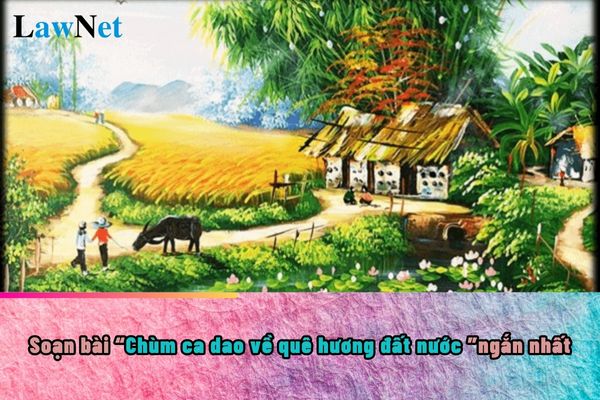What are guidelines on preparing the lesson "Chùm ca dao về quê hương đất nước" for students in Vietnam? Are grade 6 students with unsatisfactory annual training results in Vietnam required to train during summer break?
What are guidelines on preparing the lesson "Chùm ca dao về quê hương đất nước" for students in Vietnam?
"Chùm ca dao về quê hương đất nước" is one of the topics that students will study in the grade 6 Literature curriculum.
Students may refer to the brief lesson plan for "Chùm ca dao về quê hương đất nước" below:
|
Guidelines on preparing the lesson "Chùm ca dao về quê hương đất nước" * Form and Art |
Note: This information is for reference only./.

What are guidelines on preparing the lesson "Chùm ca dao về quê hương đất nước" for students in Vietnam? Are grade 6 students with unsatisfactory annual training results in Vietnam required to train during summer break? (Image from Internet)
Is 13 years old considered the right age for enrollment in grade 6 in Vietnam?
Based on Article 33 of Circular 32/2020/TT-BGDDT regulating the age of students in secondary schools:
Age of Secondary School Students
1. The age for entering grade 6 in Vietnam is 11 years old. The age for entering 10th grade is 15 years old. For students who advanced a grade level in previous schooling stages or students entering at an older age than prescribed, the age for entering 6th and 10th grade can be adjusted based on the age at graduation from the previous schooling stage.
2. Students who are ethnic minorities, students with disabilities, students in particularly difficult circumstances, students returning from abroad may enter at an age up to 3 years older than the prescribed age.
3. Students are not allowed to repeat more than 3 times in one schooling stage.
4. Students with good physical abilities and early intellectual development may start school earlier or advance a grade within a schooling stage. The review for each specific case is conducted as follows:
a) Parents or guardians submit a request to the school.
b) The principal establishes a survey and advisory council including basic components: representatives of the school leadership and the parent's committee of the school; the teacher teaching the student's class.
c) Based on the survey results from the council, the principal reviews and makes a decision.
5. Students within the prescribed age returning from abroad, children of foreigners working in Vietnam, may study at secondary schools in their place of residence or other places if the school has the capacity to accept them. Each individual case is reviewed as follows:
a) Parents or guardians submit a request to the school.
b) The principal organizes a competence assessment of the student and places them in an appropriate class.
Additionally, according to Clause 1, Article 28 of the Education Law 2019 on educational levels and ages:
Educational Levels and Ages
1. The levels and ages in general education are as follows:
a) Primary education occurs over 5 years, from grade one to the end of grade five. The age for starting grade one is 6 years old and counted by year;
b) Lower secondary education is conducted over 4 years, from grade six to the end of grade nine. A student must complete primary education to enter grade six. The age for starting grade six is 11 years and is counted by year;
c) Upper secondary education is conducted over 3 years, from grade ten to the end of grade twelve. A student must have a certificate of lower secondary education to enter grade ten. The age for starting grade ten is 15 years and is calculated by year.
2. Cases where students may advance a class or study at an older age than prescribed in Clause 1 of this Article include:
a) Students advancing a class in the case of early intellectual development;
b) Students studying at an older age than prescribed in the case of repeating a class, students from regions with particularly difficult economic-social conditions, students who are ethnic minorities, students with disabilities, students disadvantaged in terms of physical or mental ability, orphaned students, students from poor households, students returning from abroad, and other cases as regulated by law.
Thus, according to the above regulations, a 13-year-old student entering grade 6 in Vietnam is still considered the right age when falling into one of the following cases:
- Students studying at an older age due to repeating a class,
- Students who are ethnic minorities,
- Students with disabilities,
- Students in particularly difficult circumstances,
- Students returning from abroad,
- Students disadvantaged in physical or mental development,
- Orphaned students,
- Students from poor households.
Are grade 6 students with unsatisfactory annual training results in Vietnam required to train during summer break?
Based on Clause 1, Article 13 of Circular 22/2021/TT-BGDDT:
Training During Summer Break
1. Students with annual training results rated as Unsatisfactory must train during the summer break.
2. The form of training during the summer break is stipulated by the principal.
3. Based on the form of training during the summer break, the homeroom teacher assigns training tasks for the summer break to students and informs the parents. Before the end of the summer break, if the homeroom teacher assesses the training tasks as completed (with a report on the process and results, signed by the parents), the homeroom teacher may recommend the principal to re-evaluate the student's annual training results. The re-evaluation results are used to substitute the annual training results for class promotion consideration according to Article 12 of this Circular.
Therefore, according to the regulations, if a grade 6 student is classified as unsatisfactory in their annual training, they must train during the summer break.

